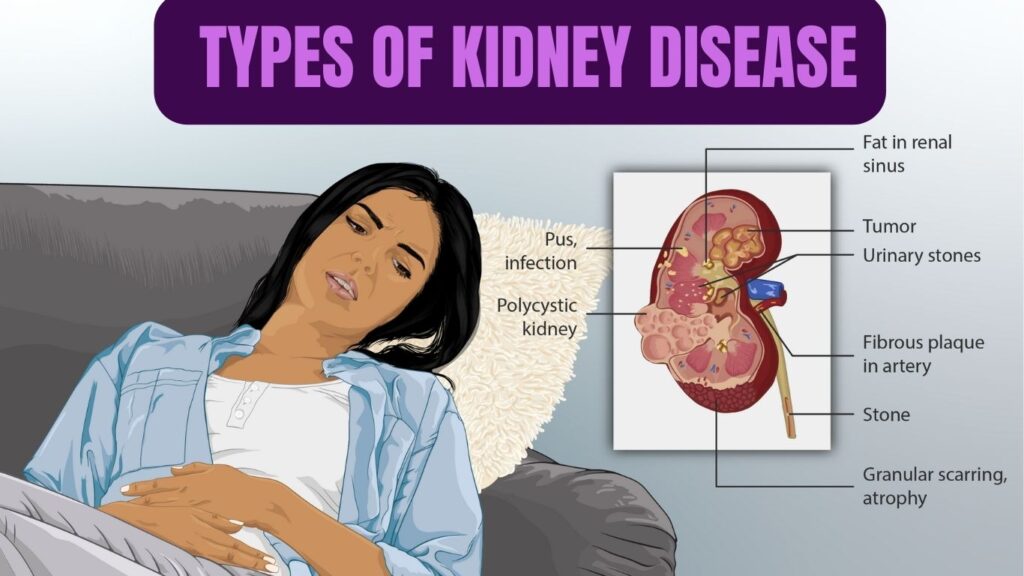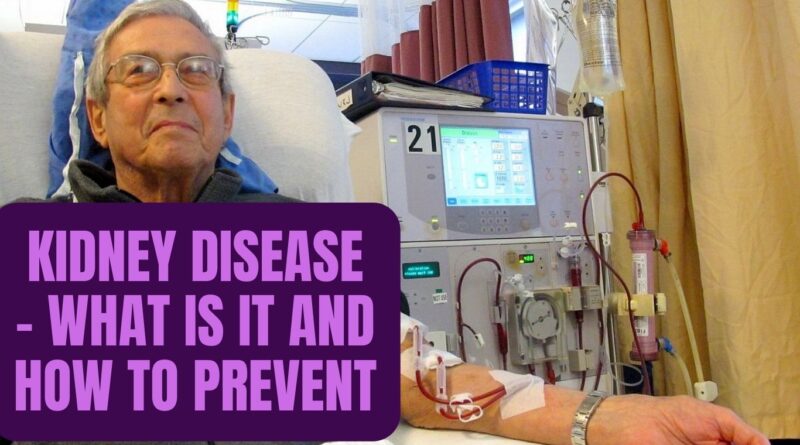Kidney Disease – What is it and How to prevent
Kidney disease is a common health issue that affects millions of people worldwide. The kidneys are vital organs that filter waste and excess fluid from the blood.
Introduction
Kidney disease is a common health issue that affects millions of people worldwide. The kidneys are vital organs that filter waste and excess fluid from the blood. When the kidneys fail to function correctly, they can lead to severe health problems.
Kidney disease, also known as renal disease, is a condition where the kidneys are damaged and cannot perform their functions effectively. The kidneys play an important role in filtering waste products from the blood and regulating fluid levels in the body. If left untreated, kidney disease can progress and lead to kidney failure, which can be life-threatening.
Kidney disease can occur due to various reasons, such as high blood pressure, diabetes, and genetics. Therefore, it is crucial to take care of your kidneys and prevent kidney disease from occurring. This article will discuss some essential tips on how to prevent and manage kidney disease.
What is cause of kidney disease
There are several factors that can cause kidney disease, lets explore the most important factors which are listed below:
- Diabetes: Diabetes is a condition that affects the body’s ability to regulate blood sugar levels. High blood sugar levels can damage the blood vessels in the kidneys and lead to kidney damage over time.
- High blood pressure: High blood pressure can damage the blood vessels in the kidneys and reduce their ability to function properly.
- Glomerulonephritis: This is a type of kidney disease that occurs when the glomeruli, which are small blood vessels in the kidneys, become inflamed and damaged. This can cause the kidneys to leak protein into the urine and lead to kidney damage over time.
- Polycystic kidney disease: This is an inherited condition that causes cysts to form in the kidneys, which can lead to kidney damage over time.
- Kidney stones: Kidney stones are hard mineral deposits that can form in the kidneys and cause pain and discomfort. If left untreated, kidney stones can cause kidney damage over time.
- Urinary tract infections: Urinary tract infections can cause inflammation in the kidneys and damage the kidneys over time.
- Autoimmune diseases: Autoimmune diseases such as lupus can cause inflammation in the kidneys and lead to kidney damage over time.
- Congenital abnormalities: Some people are born with structural abnormalities in their kidneys that can lead to kidney disease over time.
- Medications: Some medications, such as nonsteroidal anti-inflammatory drugs (NSAIDs), can damage the kidneys over time if taken in excess.
- Heavy metal exposure: Exposure to heavy metals such as lead, mercury, and cadmium can damage the kidneys over time.
In addition to these factors, lifestyle choices such as smoking, excessive alcohol consumption, and a diet high in sodium and processed foods can also increase the risk of developing kidney disease. People who are overweight or obese are also at an increased risk of developing kidney disease.
The symptoms of kidney disease can vary depending on the underlying cause, but common symptoms include fatigue, swelling in the legs and ankles, nausea, vomiting, and difficulty urinating. In some cases, people with kidney disease may not experience any symptoms until the disease has progressed to an advanced stage.
To diagnose kidney disease, doctors may perform a variety of tests, including blood tests, urine tests, and imaging tests such as ultrasound or CT scan. Treatment for kidney disease depends on the underlying cause and severity of the disease. In some cases, lifestyle changes such as diet and exercise may be enough to slow the progression of kidney disease. In other cases, medications or dialysis may be necessary to manage symptoms and prevent further damage to the kidneys.
In summary, kidney disease can be caused by a variety of factors, including underlying medical conditions, lifestyle choices, medications, and environmental factors. Early detection and treatment are important to prevent the progression of kidney disease and maintain overall health.
Symptoms of Kidney disease
The symptoms of kidney disease can vary depending on the underlying cause and the severity of the disease. Here are some common symptoms of kidney disease explained in simple layman’s language:
- Fatigue: Feeling tired or weak, even after getting enough rest, can be a symptom of kidney disease. This is because the kidneys play a vital role in producing a hormone called erythropoietin, which helps to regulate the production of red blood cells. When the kidneys are damaged, they may not produce enough erythropoietin, which can lead to anemia and fatigue.
- Swelling: Kidney disease can cause fluid to build up in the body, leading to swelling in the legs, ankles, feet, or face. This swelling may be more noticeable in the morning or after sitting or standing for long periods of time.
- Changes in urine: Changes in the color, amount, or frequency of urine can be a symptom of kidney disease. Urine may be darker than usual or have a foamy or frothy appearance. People with kidney disease may also experience frequent urination or a decrease in the amount of urine produced.
- Nausea and vomiting: Kidney disease can cause waste products to build up in the body, leading to nausea, vomiting, and a loss of appetite.
- Itching: When the kidneys are not functioning properly, waste products can build up in the blood and cause skin irritation and itching.
- High blood pressure: Kidney disease can lead to high blood pressure, which can cause damage to the blood vessels in the kidneys and lead to further kidney damage.
- Shortness of breath: Kidney disease can cause fluid to build up in the lungs, leading to shortness of breath or difficulty breathing.
- Muscle cramps: Electrolyte imbalances caused by kidney disease can lead to muscle cramps, particularly in the legs.
- Sleep problems: Kidney disease can cause sleep disturbances, including trouble falling asleep or staying asleep, and restless leg syndrome.
If you experience any of these symptoms, it is important to talk to your healthcare provider for evaluation and management. Early detection and treatment of kidney disease are important to slow the progression of the disease and prevent further damage to the kidneys.
Stages of Kidney disease
There are five stages of kidney disease, and each stage represents a different level of kidney function. Here is an overview of the five stages of kidney disease in simple layman’s language:
Stage 1: Kidney damage with normal or increased filtration rate In this stage, there may be signs of kidney damage, such as protein or blood in the urine, but kidney function is still normal. Treatment at this stage typically involves managing underlying medical conditions that can cause kidney damage, such as diabetes or high blood pressure.
Stage 2: Kidney damage with mild decrease in filtration rate In this stage, there may be a slight decrease in kidney function, but the kidneys are still able to filter waste products from the blood effectively. Treatment at this stage typically involves managing underlying medical conditions and making lifestyle changes to prevent further kidney damage.
Stage 3: Moderate decrease in filtration rate In this stage, there is a moderate decrease in kidney function, and waste products may begin to build up in the blood. Treatment at this stage typically involves managing underlying medical conditions, making lifestyle changes, and monitoring kidney function closely.
Stage 4: Severe decrease in filtration rate In this stage, kidney function is significantly decreased, and waste products can build up in the blood, leading to symptoms such as fatigue, nausea, and swelling in the legs and ankles. Treatment at this stage typically involves managing symptoms, monitoring kidney function closely, and preparing for the possibility of kidney failure.
Stage 5: Kidney failure In this stage, the kidneys are no longer able to function effectively, and waste products and fluids can build up in the body, leading to a variety of health complications. Treatment at this stage typically involves dialysis or a kidney transplant to replace the function of the kidneys.
Overall, early detection and treatment of kidney disease are important to slow the progression of the disease and prevent kidney failure. If you have any concerns about your kidney health, it is important to talk to your healthcare provider for evaluation and management.

Ways to diagnose kidney disease
Early detection and treatment of kidney disease are important to slow the progression of the disease and prevent further damage to the kidneys. Here are some common ways to diagnose kidney disease in simple layman’s language:
- Blood tests: Blood tests are one of the most common ways to diagnose kidney disease. A blood test measures the level of creatinine in the blood, which is a waste product that is normally filtered out by the kidneys. An elevated creatinine level may indicate kidney damage.
- Urine tests: Urine tests can also help to diagnose kidney disease. A urine test measures the level of protein in the urine, which is a sign of kidney damage. A urine test can also detect the presence of blood in the urine, which may be a sign of kidney damage or other medical conditions.
- Imaging tests: Imaging tests such as ultrasound, CT scans, and MRI can be used to visualize the kidneys and detect any abnormalities or damage.
- Kidney biopsy: In some cases, a kidney biopsy may be necessary to diagnose kidney disease. During a kidney biopsy, a small sample of kidney tissue is removed and examined under a microscope for signs of damage.
It’s important to note that not everyone with kidney disease will have symptoms, and some people may not be diagnosed until the disease has progressed to a later stage. That’s why routine blood and urine tests are important for early detection of kidney disease, especially if you have risk factors such as diabetes, high blood pressure, or a family history of kidney disease. If you have any concerns about your kidney health, it’s important to talk to your Doctor for evaluation and management.
What are the treatment options for kidney disease
The treatment options for kidney disease depend on the underlying cause and the stage of the disease. In general, the goals of treatment are to slow the progression of the disease, manage symptoms, and prevent complications. Here are some common treatment options for kidney disease in simple layman’s language:
- Medications: Medications may be prescribed to manage symptoms or slow the progression of kidney disease. For example, medications to control blood pressure, lower cholesterol levels, or reduce inflammation may be prescribed. Some medications may also be used to treat complications of kidney disease, such as anemia or bone disease.
- Dietary changes: Making changes to your diet can help to manage kidney disease. For example, limiting your intake of sodium, potassium, and phosphorus can help to reduce the workload on the kidneys. Eating a balanced diet that includes plenty of fruits and vegetables, lean protein, and whole grains can also be beneficial.
- Lifestyle changes: Making lifestyle changes can also help to manage kidney disease. For example, quitting smoking, reducing alcohol consumption, and getting regular exercise can all be beneficial.
- Dialysis: Dialysis is a treatment option for people with advanced kidney disease or kidney failure. Dialysis is a process that filters waste products from the blood when the kidneys are no longer able to do so. There are two main types of dialysis: hemodialysis, which involves using a machine to filter the blood outside the body, and peritoneal dialysis, which involves using the lining of the abdomen to filter the blood.
- Kidney transplant: Kidney transplant is a treatment option for people with end-stage kidney disease who are not able to undergo dialysis or who are experiencing complications from dialysis. A kidney transplant involves replacing a diseased kidney with a healthy kidney from a donor.
It’s important to note that the treatment options for kidney disease may vary depending on the individual and their specific situation. It’s important to talk to your healthcare provider about the best treatment options for you.
How can we prevent kidney disease?
Manage blood pressure
Control blood sugar
Quit smoking
Stay hydrated
Exercise regularly
Which food can reduce kidney disease?
Foods that are low in sodium, potassium, and phosphorus can reduce the risk of kidney disease.
Which food is good for kidney?
Foods that are good for the kidneys include:
Berries
Fish
Olive oil
Garlic
Bell peppers
Onions
Apples
Red grapes
Egg whites
Cauliflower
What are the 10 best foods for kidney disease?
The 10 best foods for kidney disease are:
Blueberries
Red bell peppers
Cabbage
Cranberries
Garlic
Apples
Onions
Cauliflower
Fish
Olive oil
How to clean kidneys?
To clean your kidneys naturally, you can:
Drink plenty of water
Eat kidney-friendly foods
Avoid alcohol and tobacco
Get regular exercise
Practice good hygiene
How can I improve my kidneys?
To improve kidney function, you can:
Manage underlying health conditions
Eat a kidney-friendly diet
Stay hydrated
Exercise regularly
Avoid alcohol and tobacco
What are 5 foods good for kidneys?
Five foods that are good for the kidneys include:
Berries
Fish
Olive oil
Garlic
Onions
Which fruit is best for kidney?
The best fruit for the kidneys is cranberries.
What fruits fight kidney disease?
Fruits that fight kidney disease include:
Cranberries
Blueberries
Apples
Red grapes
How can I naturally repair my kidneys?
To naturally repair your kidneys, you can:
Manage underlying health conditions
Eat a kidney-friendly diet
Stay hydrated
Exercise regularly
Avoid alcohol and tobacco
Are eggs good for kidneys?
Eggs can be good for the kidneys, but it is essential to limit their intake as they are high in phosphorus.
What are the 3 early warning signs of kidney disease?
The three early warning signs of kidney disease are:
Fatigue
Swelling in the legs, ankles, feet, or face
Changes in urine output or appearance
How do I check if my kidneys are OK?
You can check if your kidneys are okay by:
Getting regular kidney function tests
Monitoring your blood pressure and blood sugar levels
Paying attention to any symptoms of kidney disease
How do I know my kidneys are OK?
You can know your kidneys are okay by:
Getting regular kidney function tests
Monitoring your blood pressure and blood sugar levels
Paying attention to any symptoms of kidney disease
What are the symptoms of stage 1 kidney disease?
The symptoms of stage 1 kidney disease are often nonexistent or mild, and may include:
Fatigue
Changes in urine output or appearance
Swelling in the legs, ankles, feet, or face
How to cure kidney problems?
The treatment for kidney problems depends on the underlying cause. In some cases, lifestyle changes such as a kidney-friendly diet and exercise can improve kidney function. In other cases, medications, dialysis, or a kidney transplant may be necessary.
How to protect kidney naturally?
You can protect your kidneys naturally by:
Staying hydrated
Eating a kidney-friendly diet
Managing underlying health conditions such as high blood pressure and diabetes
Avoiding alcohol and tobacco
Getting regular exercise
Prevention of kidney disease?
A Prevention of Kidney Disease PowerPoint presentation would likely cover topics such as risk factors, preventative measures, and the importance of early detection and treatment.
What food to eat to prevent kidney failure?
Foods that are low in sodium, potassium, and phosphorus can help prevent kidney failure. Some examples include:
Berries
Fish
Olive oil
Garlic
Bell peppers
Onions
Apples
Red grapes
Egg whites
Cauliflower
How to improve kidney function to avoid dialysis?
To improve kidney function and avoid dialysis, you can:
Manage underlying health conditions
Eat a kidney-friendly diet
Stay hydrated
Exercise regularly
Avoid alcohol and tobacco
How to avoid dialysis and cure kidney disease ?
A “How to Avoid Dialysis and Cure Kidney Disease” such as lifestyle changes, medications, and alternative therapies that can improve kidney function and potentially avoid the need for dialysis.
Supplements to improve kidney function?
Supplements that can improve kidney function include:
Omega-3 fatty acids
Vitamin D
Probiotics
Coenzyme Q10
L-carnitine
What medications help kidney function?
Medications that can help improve kidney function include:
Angiotensin-converting enzyme (ACE) inhibitors and angiotensin receptor blockers (ARBs)
Diuretics
Phosphate binders
Statins
Note: It is essential to talk to your doctor before taking any medications, as some may interact with other medications or worsen kidney function.
Please click here to read more such articles



